
Hello, book lovers! We’re going on a rather unusual literary adventure, exploring a topic that might raise a few eyebrows but is bound to spark some lively discussions. We’re diving into the world of the most boring books in the world. Now, before you wonder why on Earth we’d venture into such territory, let’s consider this: What makes a book “boring” can be highly subjective and reveals more about our personal tastes, interests, and reading habits than the books themselves. This journey is not about criticism but curiosity, exploring why certain books might not resonate with readers and what we can learn from them.
Books that are labeled as “boring” usually share specific characteristics, such as:
Complexity: Some books are highly complex, focusing on intricate details that only some readers may appreciate.
Length: Some works are particularly long and require a sustained commitment that only some are willing or able to give.
Pacing: Slow pacing without action or tension can also make a book boring.
Subject Matter: If the subject matter doesn’t resonate with the reader or is something they find uninteresting, the book will likely be boring.
Style: A dry or academic writing style can also make a book less engaging for some readers.
Predictability: If a story is too predictable and offers no surprises or twists, it can become boring because the reader already anticipates what will happen next.
Some examples include:
“Finnegans Wake” by James Joyce is cited for its complexity and impenetrable language.
“War and Peace” by Leo Tolstoy is noted for its length and extensive list of characters.
“Das Kapital” by Karl Marx is considered difficult due to its dense economic and philosophical content.
However, many of these works are considered masterpieces or are highly influential in their respective fields, illustrating that “boring” is a subjective judgment. Identify what you find engaging or boring in a book, and then seek out or avoid those characteristics in your future reading choices.
So, with an open mind and perhaps a hint of humor, let’s discover the books that have been deemed the dullest yet just hold hidden treasures within their pages.
10 Most Boring Books Of All Time
Certain books are labeled “boring” due to their complexity or dense content. Reading such books can present an intellectual challenge, stimulating your critical thinking skills and expanding your understanding of complex ideas. Here are ten books you can try. Let’s begin!
| Name | Tropes | Average Ratings (Goodreads) |
|---|---|---|
| Moby-Dick by Herman Melville | Epic Journey and Quest, Symbolism of the White Whale, Narrative Framing, Allegory of Good vs. Evil, Philosophical Reflections, Intertextuality. | 3.5/5 |
| War and Peace by Leo Tolstoy | Historical Fiction, Epic Narrative, Societal Commentary, Love and Relationships. | 4.1/5 |
| Being and Time by Martin Heidegger | Phenomenology, Ontology, Dasein, Authenticity and Inauthenticity. | 4/5 |
| Critique of Pure Reason by Immanuel Kant | Phenomenology, Ontology, Dasein, Authenticity, and Inauthenticity. | 3.9/5 |
| The Decline and Fall of the Roman Empire by Edward Gibbon | Historical Analysis, Causes of Decline, Rise of Christianity, Complexity of History. | 4/5 |
| A Brief History of Time by Stephen Hawking | Cosmology, Black Holes, Theoretical Physics, Universe, Time. | 4.2/5 |
| Ulysses by James Joyce | Modernist Literature, Stream of Consciousness, Intertextuality, Dublin, Everyday Life. | 3.7/5 |
| The Silmarillion by J.R.R. Tolkien | Mythopoeia, Creation Myth, Elves, Middle-earth, Legendarium. | 3.9/5 |
| The History of the Peloponnesian War by Thucydides | Ancient Greek History, War and Politics, Human Nature, Historical Analysis. | 3.9/5 |
| Das Kapital by Karl Marx | Political Economy, Capitalism, Labor Theory of Value, Historical Materialism, Economic Systems. | 3.8/5 |
1. Moby-Dick by Herman Melville
Moby-Dick, or The Whale,” is a novel by American writer Herman Melville, published in 1851. The story follows the doomed voyage of the whaling ship Pequod, commanded by the monomaniacal Captain Ahab. Ahab is obsessed with hunting down Moby Dick, a giant white sperm whale that had previously destroyed Ahab’s previous ship and severed his leg at the knee. The novel is narrated by Ishmael, a sailor who joins the Pequod’s crew and provides a firsthand story of the journey and philosophical reflections on the nature of whales, whaling, and human existence.
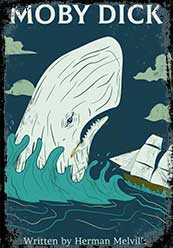
Obsession and Revenge: The character of Captain Ahab contains the theme of blinding obsession and revenge. His single-minded pursuit of Moby Dick costs him and his crew their lives.
Man vs. Nature: The book explores the futility of human attempts to conquer nature, including in the elusive and near-mythical Moby Dick.
Existentialism and Identity: Ishmael, the narrator, focuses on existential ponderings, questioning the nature of self, destiny, and the universe.
Religion and Morality: The novel also explores religious themes, including the concept of fate, morality, and the inherent goodness or evilness of humanity.
Social Critique: Though primarily a story of adventure and obsession, “Moby-Dick” also examines social issues of the time, including class divisions and the ramifications of imperialism.
Why This Book Is Boring?:
Length and Detail: “Moby-Dick” is a long novel, and Melville dedicates entire chapters to the minutiae of whaling, including the types of whales, the anatomy of whales, and the intricacies of whaling as an industry.
Pacing: The main storyline—Ahab’s pursuit of Moby Dick— takes a backseat to Ishmael’s reflections, detours into the history of whaling, and detailed descriptions of the ship and its crew.
Language: Written in the 19th century, the language can be archaic and the sentence structure complex, which some modern readers find challenging.
Complex Themes: The novel’s philosophical and existential themes may not be everyone’s cup of tea.
Despite these potential hurdles, this is considered one of the greatest American novels. It’s a rich source that explores human psychology, the limits of knowledge, the complexities of good and evil, and the unpredictable and uncontrollable nature of existence.
2. War and Peace by Leo Tolstoy
War and Peace is a seminal novel by the Russian author Leo Tolstoy, first published from 1865 to 1869, and the most boring book ever written. It is considered one of the greatest works of world literature. The novel is set in the context of the Napoleonic Wars, particularly the French invasion of Russia in 1812, and explores the impact of these historical events on society and individuals. It follows the lives of several Russian noble families and provides a sweeping view of both Russian society and the broader existential issues that confront humanity.
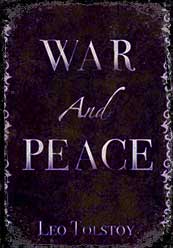
The Nature of History and Fate: One of the novel’s most notable themes is its inquiry into the nature of history. Tolstoy questions the role of people in shaping historical events, suggesting that many factors beyond human control shape the course of history.
War and Humanity: Tolstoy does not romanticize war but presents it as chaotic, destructive, and deeply traumatic, yet also a setting where human virtues and vices are amplified.
Social Structures: The novel critiques the hierarchies and artificialities of Russian high society, challenging the assumptions of a class-based system.
Family and Relationships: This family saga explores various kinds of relationships, including love, friendship, and familial bonds, and how these are tested and transformed over time.
Spiritual and Moral Development: Several characters in the novel undergo profound changes in their worldview, experiencing moral and spiritual awakenings.
Why Some People Find It Boring?:
Length: The novel’s sheer length is one of the most obvious hurdles. It’s not only the page count that’s daunting; it’s also the narrative scope.
Multiple Characters and Subplots: The novel has many characters and subplots that can be challenging to keep track of.
Historical Details: Tolstoy includes significant historical detail and philosophical digression, which enrich or sidetrack the story depending on the reader’s interest level.
Complex Narration: Tolstoy frequently switches between different forms of narration, including third-person omniscient narrative, historical analysis, and philosophical discourse.
Pacing: The story can shift from high-stakes battle scenes to quiet, reflective moments, appealing to only some readers.
Despite the commitment it requires, I found the experience of reading “War and Peace” profoundly rewarding.
3. Being and Time by Martin Heidegger
“Being and Time” (“Sein und Zeit”) is a philosophical work by German philosopher Martin Heidegger, first published in 1927. The book is considered one of the most important and influential works in existential philosophy and 20th-century philosophy more broadly.
In it, Heidegger examines the concept of “Being” (Sein) and seeks to clarify the meaning of this foundational concept by exploring the experience of “being-in-the-world” as an entity that both exists and engages with the world—what he calls “Dasein” or “being-there.”
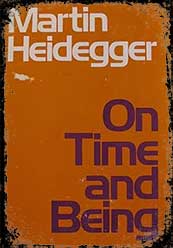
Ontology and the Concept of Being: Heidegger takes up the task of reviving ontology, the study of Being, which he felt needed to be addressed in Western philosophy. He attempts to unravel the complexities of what it means “to be.”
Existential Analysis: Heidegger’s concept of “Dasein” investigates the modes of human existence, including death, anxiety, and temporality.
Hermeneutics: The book employs a hermeneutic method, a form of interpretation, to explore the conditions that make human experience and understanding possible.
Authenticity: Heidegger introduces the concept of “authenticity” as a way to live a life that is true to one’s Being, as opposed to the “inauthenticity” perpetuated by societal norms and distractions.
Phenomenology: Although Heidegger later distanced himself from phenomenology, “Being and Time” is a pivotal work in the phenomenological tradition, focusing on conscious experience as a pathway to understanding Being.
What Makes This Book Boring?
Complexity and Abstraction: “Being and Time” is notoriously difficult to read due to its abstract and opaque language.
Specialized Vocabulary: Heidegger introduces a host of new terms and employs existing terms in specialized ways, which can be challenging for readers unfamiliar with his terminology.
Length and Depth: The book is long and dense, requiring significant time and mental energy.
Heavy Philosophical Themes: The book’s existential and ontological themes may not appeal to those looking for a more straightforward or practical read.
This book continues to be studied and debated extensively and is cited in discussions about the nature of existence, meaning, and human understanding.
4. Critique of Pure Reason by Immanuel Kant
Critique of Pure Reason (“Kritik der reinen Vernunft”) is a work of philosophy by Immanuel Kant, first published in 1781 and revised in 1787. This seminal text is considered one of Western philosophy’s most significant and challenging works.
Kant aims to explore the relationship between human knowledge and reality. He seeks to resolve the tensions between empiricism, which claims that all knowledge comes from sensory experience, and rationalism, which argues that knowledge can be gained through reason alone.
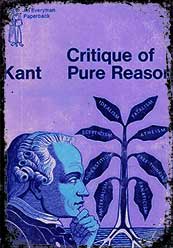
Epistemology: At its core, the book explores human knowledge—its origins, limits, and validity. Kant outlines a new framework for understanding how we come to know what we know, incorporating elements of both empiricism and rationalism.
Phenomena vs. Noumena: Kant distinguishes between the world as we see and understand it (phenomena) and the world as it actually is, independent of human observation (noumena). According to Kant, we can never have direct knowledge of noumena.
Transcendental Idealism: The author introduces the notion of “transcendental idealism,” asserting that all we can know are the structures that our minds impose upon reality.
Limits of Reason and Metaphysics: One of Kant’s most famous conclusions is that specific fundamental questions of metaphysics (e.g., the existence of God, the nature of the self, and the origins of the universe) are beyond the scope of human reason.
Why This Is A Boringest Book?
Complexity and Difficult Language: The book is difficult to read and understand, employing complex arguments and a specialized philosophical vocabulary.
Length and Density: “Critique of Pure Reason” is a long, dense work with intricate arguments requiring careful reading and interpretation.
Abstract Nature: The book deals with abstract concepts that are not easily relatable or immediately applicable to everyday life.
Conceptual Depth: Kant covers deep, convoluted, metaphysical, and epistemological discussions, which may be intimidating or inaccessible for some readers.
Kant’s ideas have been foundational for modern philosophy, influencing a range of thinkers and sparking numerous debates on subjects from epistemology to ethics.
5. The Decline and Fall of the Roman Empire by Edward Gibbon
The Decline and Fall of the Roman Empire is a monumental work of history by Edward Gibbon, first published in six volumes between 1776 and 1788. The book chronicles the history of the Roman Empire from its zenith during the reign of Trajan (98–117 AD) to its fall in the West in 476 AD and in the East with the fall of Constantinople in 1453. Gibbon’s work remains one of the most comprehensive historical stories of the Roman Empire and has set a standard for writing history.
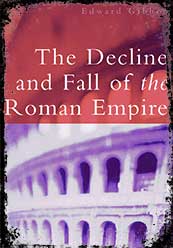
Decay of Civic Virtue: One of Gibbon’s main arguments is that the Roman Empire declined due to a decay of civic virtue among its citizens. He attributes the decay to various factors, including excessive taxation, military spending, and moral decline.
Impact of Christianity: Gibbon controversially argues that the spread of Christianity weakened the Roman Empire. He asserts that the faith made Romans less patriotic and more focused on the afterlife, thus eroding civic duty and military commitment.
Military and Governance: The decline in military efficiency and the complexity of governance, particularly in dealing with various barbarian invasions, are other reasons for the decline.
Historical Methodology: Beyond the subject matter, Gibbon’s work is renowned for its methodology. He utilized primary sources and was meticulous in his use of evidence, setting a new standard for historical scholarship.
Critical Perspective: Gibbon critically analyzes the sources he consults, adding a layer of meta-commentary that enriches the narrative.
Why This Is One Of The Most Boring Books?
Length and Detail: The work is exhaustive, running into several thousand pages with numerous footnotes. The sheer scale can be daunting.
Outdated Language: The English used by Gibbon is from the 18th century and can be challenging for modern readers.
Historical Detail: The level of detail, while comprehensive, can also be overwhelming. Gibbon covers centuries of complex history, filled with numerous characters and events.
Pacing: Because of its comprehensive nature, the book can slowly progress through eras and significant events, which may not suit readers looking for a quick overview.
The book also offers keen insights into the complexities of imperial rule, military strategy, and social change, and its methodological contributions to history have been immense. This work remains a must-read despite the commitment it requires.
6. A Brief History of Time by Stephen Hawking
A Brief History of Time is a popular science book by physicist Stephen Hawking, first published in 1988. This famous boring book aims to explain complex theories in cosmology, including the Big Bang, black holes, and the nature of time, to a general audience devoid of mathematical equations and technical jargon. It became an international bestseller and brought the author widespread fame.
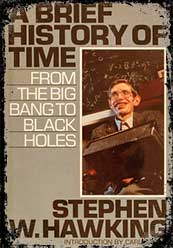
The Big Bang: Hawking discusses the leading theory on the universe’s origins, detailing the conditions that led to the immense explosion and the universe’s subsequent expansion.
Black Holes: The book covers the nature of black holes, their discovery, and the paradoxes they present in both classical and quantum physics.
Time: One of the central focuses of the book is the nature of time itself. Hawking explores how our understanding of time has evolved and how it fits into the cosmological models.
Quantum Mechanics and Relativity: The book also tackles the two pillars of modern physics, general relativity and quantum mechanics, and describes attempts to unify them, like string theory.
Fate of the Universe: Hawking explores various scenarios concerning the universe’s future, whether it will continue to expand forever or eventually collapse.
Why Some People Consider It Dull?
Conceptual Complexity: Despite Hawking’s efforts to simplify, the topics are inherently complex and can be challenging for those with a physics or mathematics background.
Lack of Mathematical Detail: For those with a deeper understanding of physics, the absence of mathematical equations can be a limitation.
Broad Range of Topics: The book covers a wide array of subjects within a relatively short span, which can overwhelm some readers.
Outdated Information: Although the book has updated editions, some scientific theories and discoveries have evolved since its first publication.
The book did much to popularize science and make cosmology accessible to the general public. It also sparked interest and debate about our understanding of the universe and our place in it.
7. Ulysses by James Joyce
“Ulysses” by James Joyce, first published in 1922, is considered one of the most important works of modernist literature. The novel is set in Dublin, Ireland, on June 16, 1904, and follows the parallel journeys of Stephen Dedalus and Leopold Bloom over a single day. The book has a complex structure, intricate language, and deep thematic explorations.
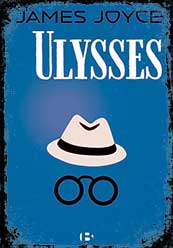
Stream of Consciousness: One of Joyce’s most significant contributions to literature is his use of the stream of consciousness technique, which aims to depict the continuous flow of thoughts and feelings of the characters.
Identity and Self: The novel covers the intricacies of identity—national, religious, and individual—as Stephen and Bloom navigate their lives in Dublin.
The Human Experience: By focusing on the characters’ seemingly ordinary activities and thoughts, “Ulysses” elevates the mundane aspects of daily life to an epic scale.
Intertextuality: The structure and narrative of “Ulysses” are heavily influenced by Homer’s “Odyssey,” the novel covers countless other literary, historical, and cultural references.
Language and Structure: “Ulysses” employs a variety of literary styles, including dramatic dialogue, prose, and even parody, making it a complex but rewarding read.
Why Some Readers Find It Boring?:
Complexity: The novel’s dense language, non-linear narrative, and intricate themes can make it a challenging read, requiring close and careful attention.
Length: “Ulysses” is a long novel, with over 700 pages filled with complex dialogue, internal monologue, and descriptive prose.
Obscure References: The book contains many references to other literary works, historical events, and scholarly ideas, which might need to be clarified or off-putting for some readers.
Lack of Traditional Plot: The novel doesn’t follow a conventional storyline, focusing instead on its characters’ inner lives, which some readers might need to be more engaging.
For those who engage deeply with the text, “Ulysses” can offer an incredibly rich reading experience full of psychological depth and intricate layers of meaning. It’s a book many people find they can return to repeatedly each time they discover something new.
8. The Silmarillion by J.R.R. Tolkien
Posthumously published in 1977, the Silmarillion is a collection of mythopoeic stories by J.R.R. Tolkien, edited and published by his son, Christopher Tolkien. It is a foundational text for Middle-earth, the setting for “The Lord of the Rings” and “The Hobbit.” “The Silmarillion” is not a novel per se but a compendium of tales ranging from the universe’s creation to the events leading up to “The Lord of the Rings.”
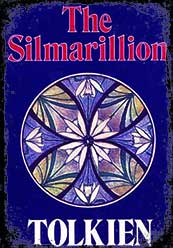
Creation and Cosmology: The book begins with the Ainulindalë, the creation of the universe, followed by the Valaquenta, which describes the divine beings that inhabit it.
Good vs. Evil: “The Silmarillion” explores the eternal struggle between good and evil, most prominently displayed in the conflict between Morgoth (the first Dark Lord) and the free peoples of Middle-earth.
Destiny and Free Will: Characters in “The Silmarillion” grapple with the tension between their destinies and their freedom to choose, a theme that permeates Tolkien’s other works.
Loss and Tragedy: One of the most pervasive themes in the book is loss, tragedy, and the decline of civilizations and beings that were once great.
Myth and Legend: The work reads like an ancient epic or a collection of myths and legends, contributing to the depth and complexity of Tolkien’s created world.
Why Some People Find It Tedious?:
Complexity: Unlike “The Lord of the Rings,” which follows a relatively linear narrative, “The Silmarillion” comprises multiple stories with many characters and subplots, making it complex and sometimes hard to follow.
Pacing: The narrative can feel uneven, especially when it shifts from detailed storytelling to a more historical or annalistic style.
Lack of Focus: The book spends little time on character development, which some readers find less engaging.
Tone: The book’s tone is more formal and archaic than “The Lord of the Rings,” which could be off-putting to those accustomed to more modern narrative styles.
For Tolkien enthusiasts or those interested in the craft of world-building, “The Silmarillion” is a rewarding but challenging read.
9. The History of the Peloponnesian War by Thucydides
“The History of the Peloponnesian War” is an ancient historical story and one of the most boring books in the world. Thucydides was an Athenian historian and general in the 5th century BCE. The work details the conflict between the Athenian Empire and the Peloponnesian League, led by Sparta, from 431 to 404 BCE. The war was pivotal in ancient Greek history and had lasting ramifications for the Greek city-states involved.
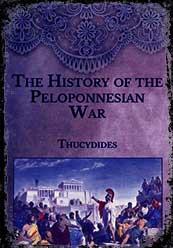
Realpolitik and Power Politics: Thucydides offers a largely unsentimental, realistic view of political decision-making. His analysis boils down to power dynamics and self-interest.
Human Nature: Thucydides presents a bleak view of human nature, suggesting that people are driven by fear, honor, and self-interest. These drives can both initiate conflict and dictate its course.
Democracy and Oligarchy: The war presents a clash not just of cities but of political systems, notably Athenian democracy and Spartan oligarchy.
War and Morality: Thucydides highlights how the exigencies of war can lead to moral and ethical corruption for individuals and entire societies.
Historical Method: Thucydides was among the first to use a rigorous methodology for gathering his data, emphasizing the importance of eyewitness accounts and verifiable facts.
Why Some People Find It Monotonous?
Detail and Complexity: Thucydides offers an incredibly detailed war story, including complex military strategies, long speeches, and diplomatic negotiations, which can be hard to follow.
Lack of Narrative Flair: Unlike Herodotus, considered the “Father of History,” Thucydides’ style is more straightforward and less entertaining, focusing more on factual presentation.
Remote Context: Modern readers find the ancient political and military context alien, making it harder to engage with the text.
Length: The work requires a significant time commitment to grasp the complexities of the events described fully.
For anyone interested in history, politics, or philosophy, this book offers timeless insights into human behavior and governance.
10. Das Kapital by Karl Marx
Das Kapital, also known simply as “Capital,” is a seminal work of political economy, first published in 1867. This hard, classic, boring book puts you to sleep. The book aims to reveal capitalism’s economic laws and contradictions and is cited as one of the foundational texts for the theories of Marxism. It is complex, thorough, and dense, with rigorous logical arguments and elaborate economic concepts.
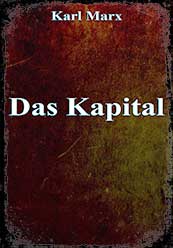
Surplus Value: Marx’s central idea posits that the labor required for production determines the value of a commodity. However, capitalists accumulate the surplus value as profit since they pay workers less than what the workers produce.
Commodity Fetishism: Marx argues that under capitalism, social relations between people are masked as relationships between commodities, leading to alienation and the reification of market dynamics.
Historical Materialism: Marx applies his broader philosophy of history and society, arguing that economic conditions and relations of production shape the course of history.
Class Struggle: Inherent in Marx’s analysis is the tension between the working class (proletariat) and the owning class (bourgeoisie), a relationship defined by exploitation.
Critique of Capitalism: The work serves as an exhaustive critique of the capitalist mode of production, highlighting its internal contradictions and unsustainability.
Why Some Readers Find It Boring?:
Complexity: “Das Kapital” is a challenging and hard read due to its complex arguments, use of technical jargon, and detailed economic analysis.
Length: The work is extensive and requires time and mental energy to understand its arguments fully.
Academic Style: Marx’s writing can be dense and academic, making it complex for those unfamiliar with economic and philosophical terminology.
Ideological Reservations: Some people may find the book’s ideological underpinnings hard to engage with, especially if they are not sympathetic to its criticisms of capitalism.
For those looking to focus deep into economic theories or interested in the ideological foundations of different social systems, “Das Kapital” is an essential read. Though challenging, it offers a comprehensive and still-relevant analysis of the capitalist mode of production, offering tools for understanding many aspects of contemporary economic systems.
What To Do If You Find A Boring Book?
Finding a book boring can be a frustrating experience, especially if you have high hopes for it. However, there are several strategies you can employ to make the most out of the situation:

Skim or Skip Section: If you find specific sections of the book particularly dull, you can skim through them to get to the parts that interest you more.
Take Breaks: Sometimes, a book may feel boring because you’re not in the right mood or mindset. Taking a break and coming back to it later might change your perception.
Evaluate Why It’s Boring: Understanding why a book is boring can help you decide whether to continue. Is it the pacing, the characters, the language, or something else? If only one aspect is bothering you, you can persevere, hoping other elements will improve.
Supplement Your Reading: If you find the subject matter exciting but boring, consider supplementing it with more engaging content on the same topic—perhaps a documentary, article, or another book that approaches the subject differently.
Discuss with Others: Sometimes, discussing a book with someone else can offer new perspectives that make it more interesting. Book clubs, online forums, and social media can be good places to do this.
Set It Aside: If you’re not enjoying the book, set it aside and pick up something else. Life’s too short to read books you don’t enjoy!
Push Through: If the book is essential for academic or professional reasons, or if you’re determined to see why it’s considered a classic, you may push through, even if you’re not enjoying it.
Write a Review: Sometimes articulating why you found a book boring can be a cathartic experience and can help you refine your understanding of your reading preferences.
Revisit at Another Time: Numerous factors, such as your current mood, experiences, or environment, can influence your book enjoyment. A book that bores you today may become interesting at another point.
Use it as a Learning Experience: Even if you find a book boring, you can use the experience to understand your tastes in literature better, helping you make more informed choices.
How Can You Read A Book Without Boring It?
Reading a book without getting bored involves choosing the right material and using strategies to pique your interest. Here are some tips to make your reading experience more enjoyable:

Before You Start Reading
Know Your Interests: Choose a book that aligns with your interests or goals, whether a fast-paced thriller, a historical account, or a technical book related to your career.
Research the Book: Read reviews or summaries before committing to ensure the book’s content and style match your taste and reading goals. You can read sample pages online to get a feel for the book.
Set the Right Expectations: Know what you want from the book—entertainment, knowledge, or inspiration. This will help you choose the right material and frame your reading experience.
While Reading
Start Small: If you’re worried about getting bored, wait to commit to long reading sessions. Start with a chapter or a certain number of pages and gradually increase your reading time.
Eliminate Distractions: Find a quiet, comfortable place to read where you won’t be easily distracted. Turn off or silence your phone, and let others know you’re taking time to read.
Engage With the Text: Take notes, highlight passages, or jot down questions as you read. This active engagement can make your reading experience more interactive and enjoyable.
Adjust Your Reading Speed: Not all material should be read at the same speed. Scan less important sections and slow down for critical or complex parts. Varying your reading speed can make the process more engaging.
Visualize: Use your imagination to visualize scenes, characters, or concepts. This can make the reading more enjoyable and help you understand the material better.
Take Breaks: If you feel bored or overwhelmed, take short breaks to do something physical or engage your mind differently. You’ll come back to the book with a refreshed perspective.
Discuss With Others: Talking about what you’re reading can enhance your understanding and make the book more enjoyable. Whether in a book club or just chatting with friends, discussion can add a social element to reading.
Set Goals and Rewards: Make your reading more game-like by setting achievable goals. Reward yourself when you meet them. It can be as simple as enjoying a treat after a chapter or planning a fun activity after finishing the book.
Mix It Up: If you’re finding it hard to focus on one book, try alternating between different types of books or articles to keep your interest up.
If You Get Bored
Reevaluate: If you are bored despite these strategies, ask yourself why. Is it the content? The writing style? Knowing why you’re bored can help you decide whether to continue or pick up something else.
I hope you’ve found this exploration both amusing and insightful. One reader’s snooze-fest is another’s masterpiece, highlighting the beautifully diverse world of literature we’re lucky to delve into. Whether a book is deemed boring or breathtaking, it’s all part of the grand adventure of reading.
So, I encourage you to pick up a book, any book, and dive in. Who knows? You’ll find unexpected joy in a story that others have passed by. Thank you for joining me on this peculiar journey. Until next time, keep reading, stay curious, and never be afraid to turn the page on something new. Happy reading adventures, everyone!
Read More:
10 Most Powerful Books In The World
10 Most Dangerous Books In The World
10 Most Difficult Philosophy Books
Table of Contents

